Resume Dos and Don’ts:
How to Get the Interview
Here’s a hard truth: a hiring manager will probably only spend between 30 seconds
and two minutes scanning your resume. http://www.business2community.com/human-resources/25-fun-facts-resumes-interviews-social-recruitment-0975676#zOEpW00gizMJB5hj.97 Moreover, your resume may not even make it to a manager if you don’t
include the right keywords because most large companies use computer software to search resumes and narrow them
down to the most relevant. http://recareered.com/blog/2010/02/16/10-ways-to-manage-your-resume-real-estate/
How can you get noticed in a crowded field? Read on to learn how to craft a resume and cover letter that will make a hiring manager want to pick up the phone and schedule an interview.
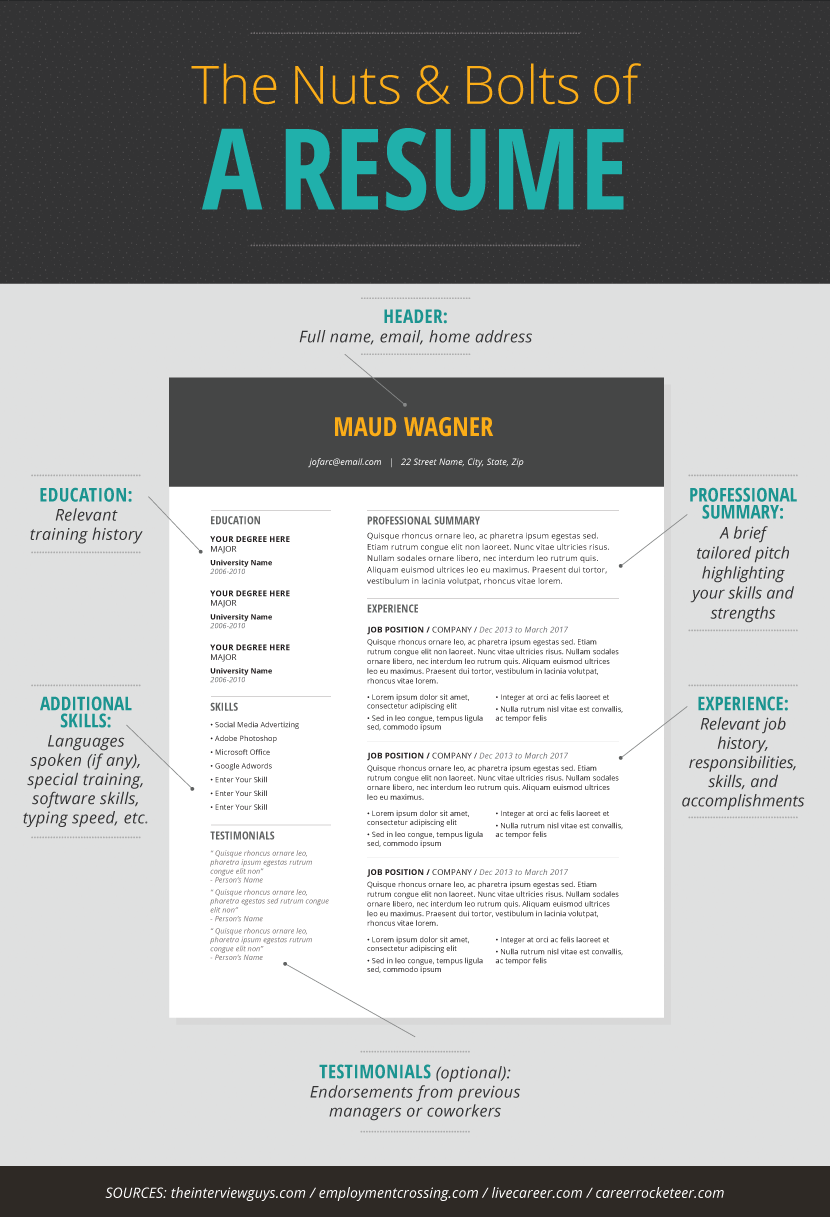
Get Started
Your resume needs to be well-written and clearly organized.
And most importantly, it needs to convince a manager you’re the perfect match for a job.
For that reason, blanketing employers with a one-size-fits-all resume is rarely successful.
You’ll have far more success by crafting a tailored resume for each job.
However, it’s helpful to start the writing process by crafting a general resume that includes details about your
past employment, education, training, and accomplishments.
You won’t actually send this one out, but it will be a useful worksheet to use later when you’re crafting targeted resumes. https://www.linkedin.com/pulse/polishing-your-resume-devils-details-brad-goettemoeller
Stick with simple formatting and a conventional structure.
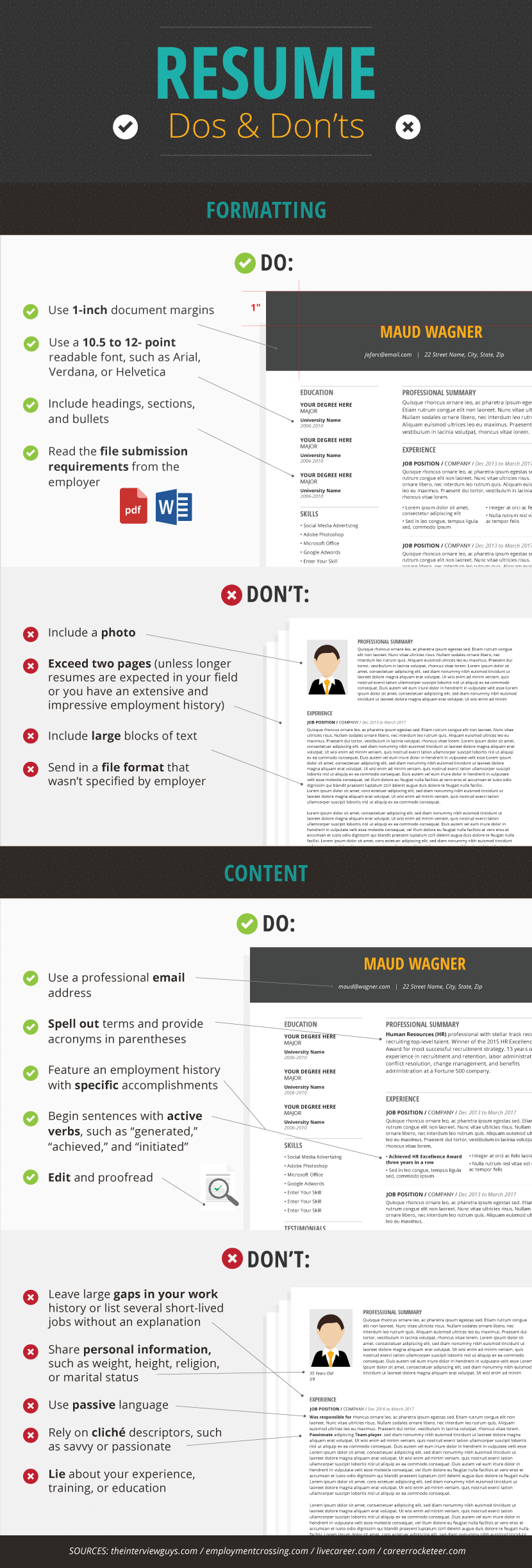
Show You’re Accomplished
According to a study, recruiters spend 80 percent of their time looking at only four elements of a resume:
Thus, it’s worth putting time and effort into making your employment history shine.
List your past jobs in reverse chronological order; don’t bother going back further than 10 years unless you think it will be
advantageous for you. https://www.recruiter.com/i/dont-get-creative-with-your-resume/ If possible, show a career progression with increasing levels of responsibility.
Next, identify skills, responsibilities, and accomplishments for each job.
Skills are specific abilities that are transferrable to a new job. Responsibilities are the duties you performed.
(Begin these with action verbs, and leave out the personal pronoun “I,” which is implied.)
Accomplishments are specific, measurable achievements you attained.
Here’s an Example:
- Position: Chief Financial Officer of Bridge Charter Academy
- Skill: Budget Analysis
- Responsibility: Managed an annual budget of $3 million dollars
- Accomplishment: Secured funding to increase the annual budget by $300,000, enabling Bridge Charter to hire a full-time school nurse and two additional certified teachers.
As you may have guessed, accomplishments tend to be the most persuasive piece of information for potential employers. If possible, include several for each job. If you’re stumped for accomplishments, brainstorm about these questions:
- Did you save the company money?
- Did you implement new procedures that measurably improved outcomes?
- Did you win any awards or accolades?
- Did a supervisor promote or recognize you? When and for what?
- Did you exceed quotas or goals? By how much?
Use the Challenge-Action-Results model to put accomplishments in context.
Here’s how: describe a challenge you faced, an action you took in response, and the results of your action.
Quantify the outcomes with numbers and percentages whenever possible.http://www.distinctiveweb.com/resume-writing/the-3-key-elements-to-writing-an-irresistible-resume-that-gets-results/
Example: “Revamped the inefficient editorial calendar to improve content turnaround time by 25%.”
Tailor and Target
Ninety percent of large companies and many mid-sized organizations rely on applicant tracking systems to scan and
narrow down massive databases of resumes. http://www.npr.org/2012/10/06/162440531/why-companies-use-software-to-scan-resumes If you want your resume to get a look, you need to include the specific terms or
phrases the hiring team is searching for.http://www.pbs.org/newshour/making-sense/ask-the-headhunter-why-you-cant-win-the-keyword-resume-game/ There’s no way to know for sure which keywords will be important for a particular job,
but you’ll find some clues in the job description.
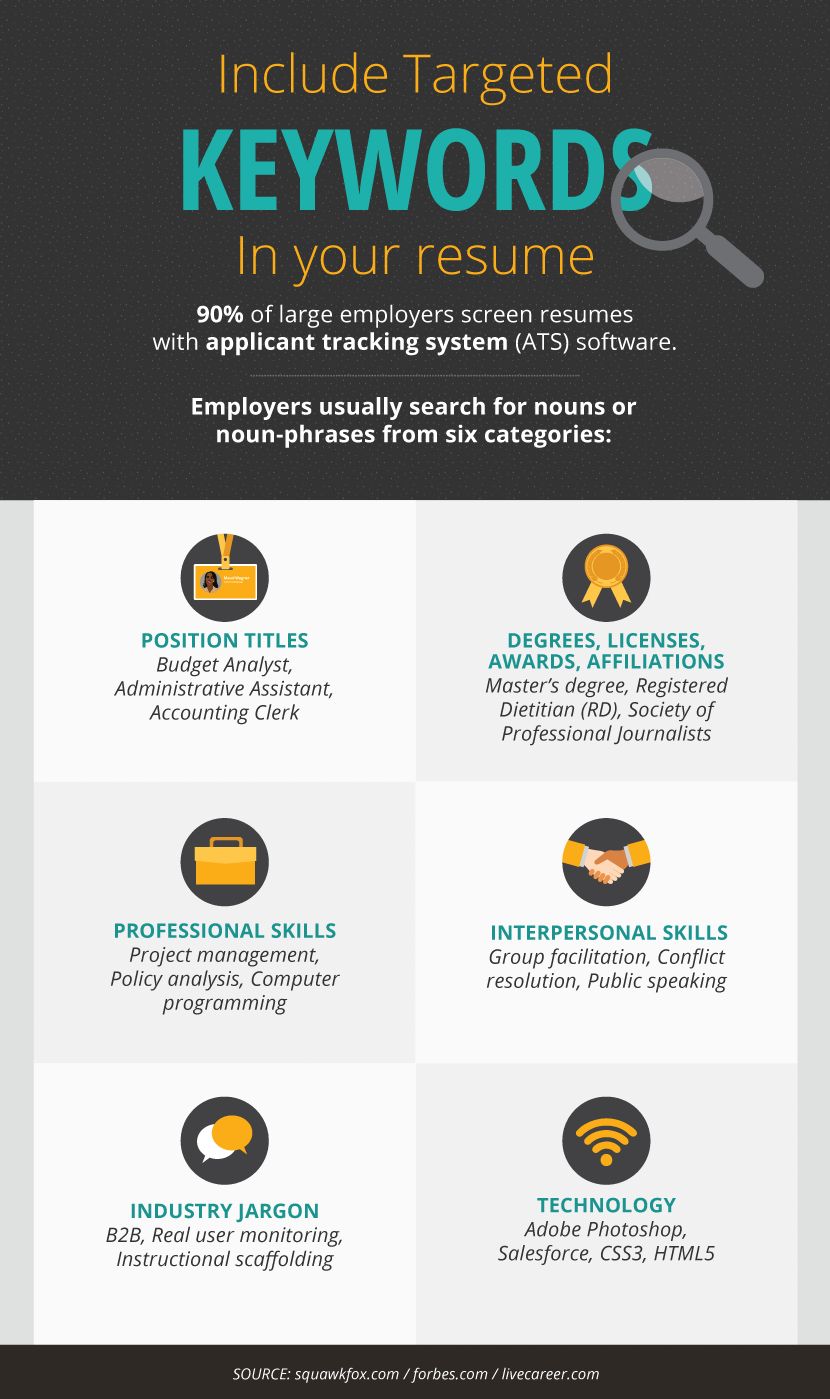
Include the exact job title of the job you want somewhere in your resume, preferably in your employment history. (Most applicant tracking systems rank keywords higher when they’re used in the context of your employment history.)
Then, study the first three responsibilities in the job posting. According to Jerome Young, founder of AttractJobsNOW.com, these offer the most clues about what an employer is looking for. Make sure your resume and cover letter include many keywords from these responsibilities and convince the employer you’re accomplished in these areas. https://www.forbes.com/2010/07/20/job-posting-listing-leadership-careers-hiring.html
Craft a Strong Opening
Traditionally, job searchers included a career objective at the top of their resume stating the type of position they are looking for.
However, this approach may be outdated. https://www.theladders.com/p/6098/trade-up-to-executive-summary Many experts now recommend a professional summary that pitches your skills and experience. (This section is sometimes called a summary of qualifications, executive summary, or resume summary statement.)
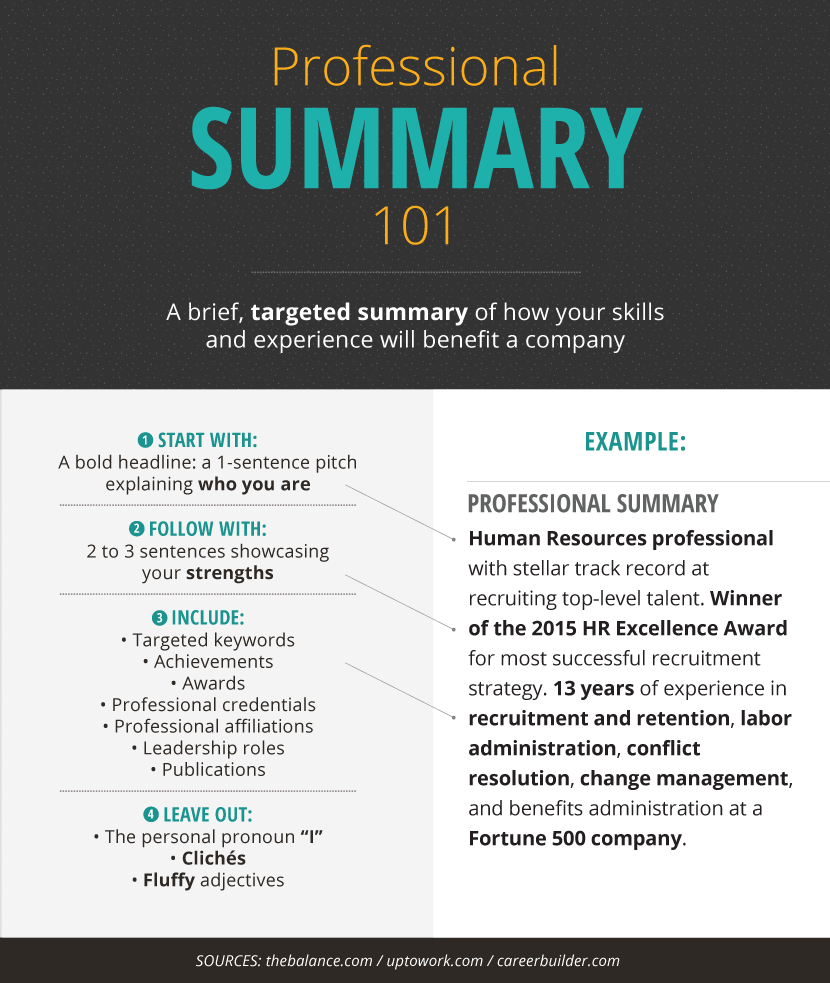
Write a Cover Letter
Once you’ve crafted a targeted resume, it’s time to tackle the cover letter.
Be yourself. Hiring managers will read your cover letter, and they tend to be most swayed by straightforward, conversational writing.
Instead of a humdrum opening, such as, “I’m writing to apply for the position of…,” hook your reader with an engaging story that shows your interest in the company, for instance,“I spent my childhood begging my parents to attend Cleveland Cavaliers games, so I was thrilled to see the position for the Cavaliers Retail Warehouse Coordinator.”
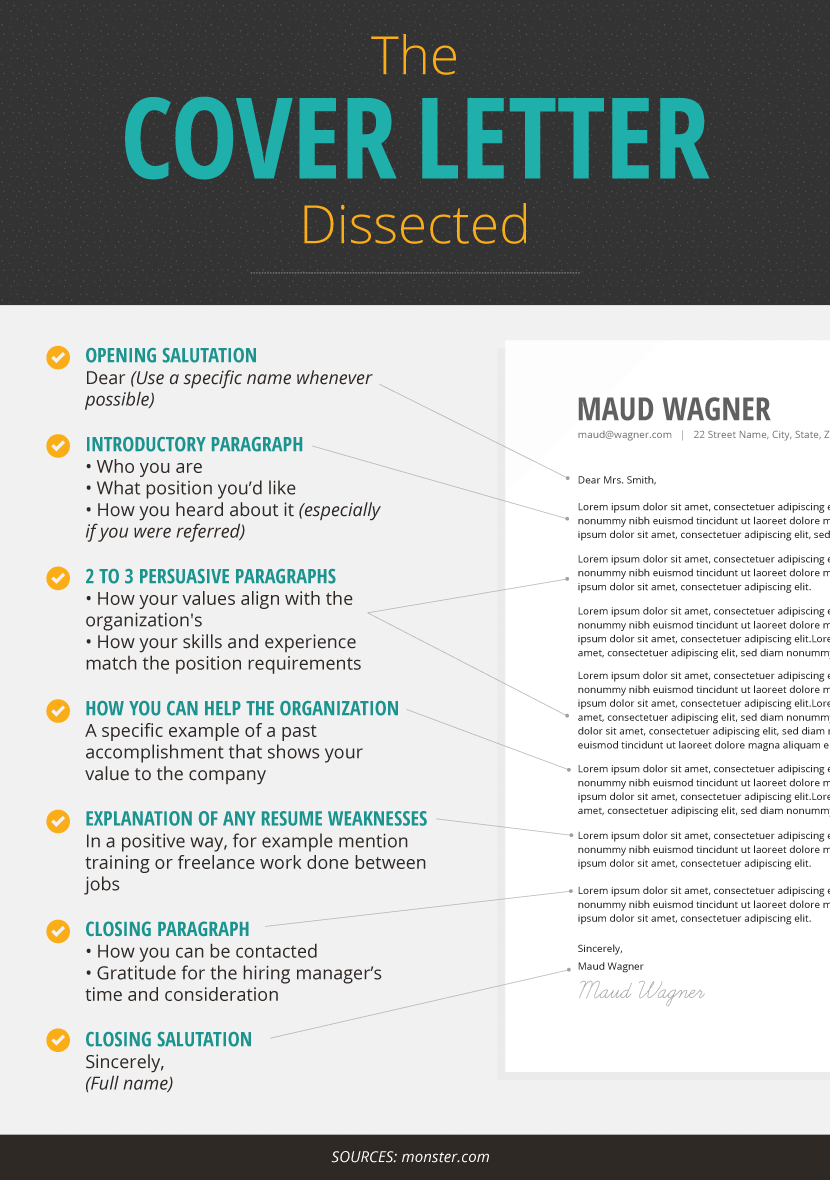
If you haven’t already, check out the company’s website, social media feeds, and annual report to help you understand the corporate culture, and reflect the company’s tone and language in your letter. For example, if you’re targeting a bank with a formal website, stick with a professional tone. However, if you’re targeting a company connected to outdoor activities which has informal web copy, be conversational and mention that you hike.
Get Out There
A strong resume is crucial, but it’s only part of a successful job-search strategy.
Eighty-five percent of people find jobs through networking, according to a recent survey.https://www.linkedin.com/pulse/new-survey-reveals-85-all-jobs-filled-via-networking-lou-adler Thus, it pays to get to know people in your industry. And don’t neglect your social networks.
Ninety-three percent of hiring managers search LinkedIn for recruits, and 68 percent of employers look at job candidates’
Facebook profiles.http://www.marketwatch.com/story/how-recruiters-screen-you-on-linkedin-2014-05-02 http://www.business2community.com/human-resources/25-fun-facts-resumes-interviews-social-recruitment-0975676#zdLsfgIxZf5rUCUy.97 Make sure your public profiles make you look appealing to potential employers.
Embed the article on your site

